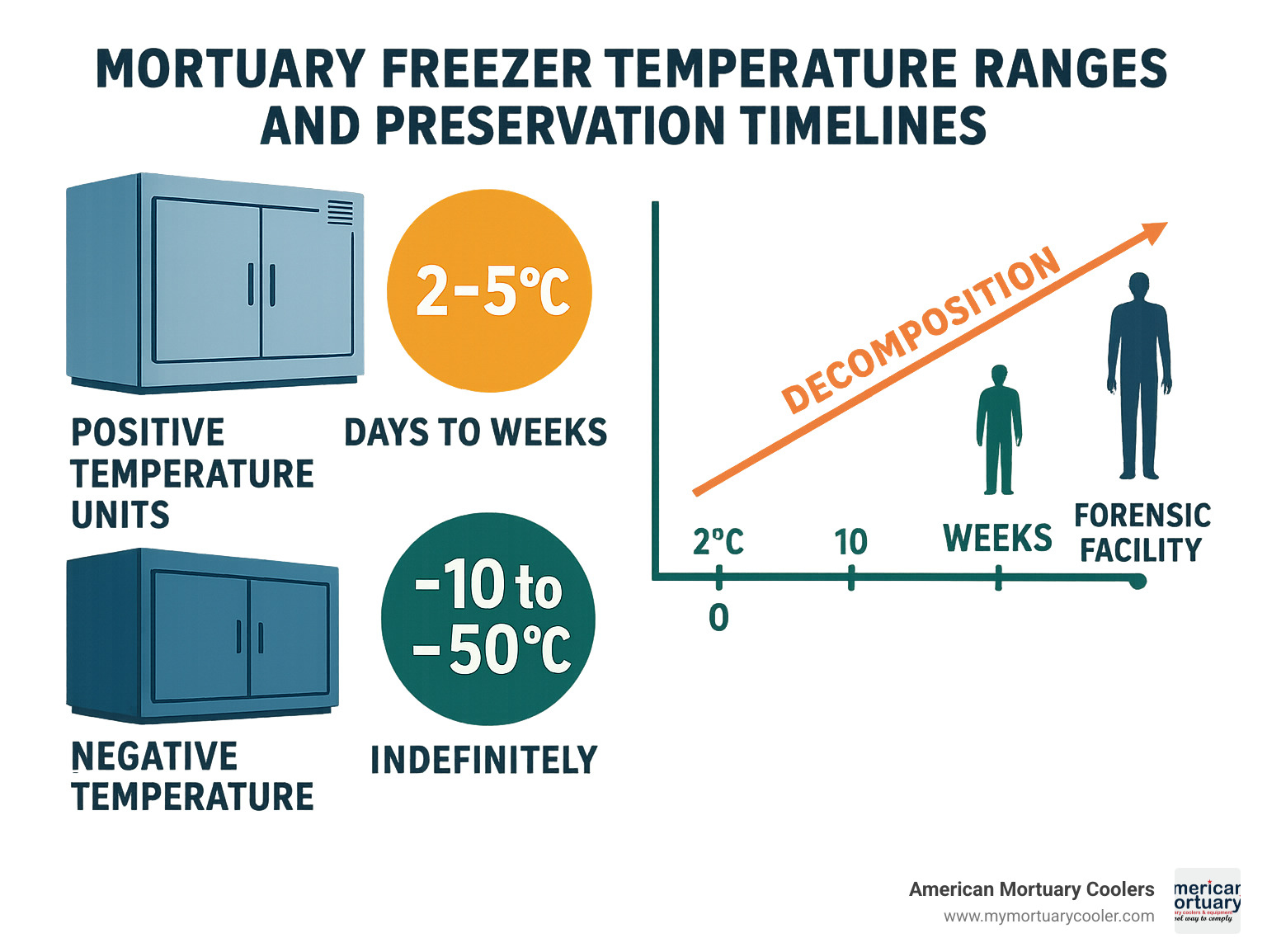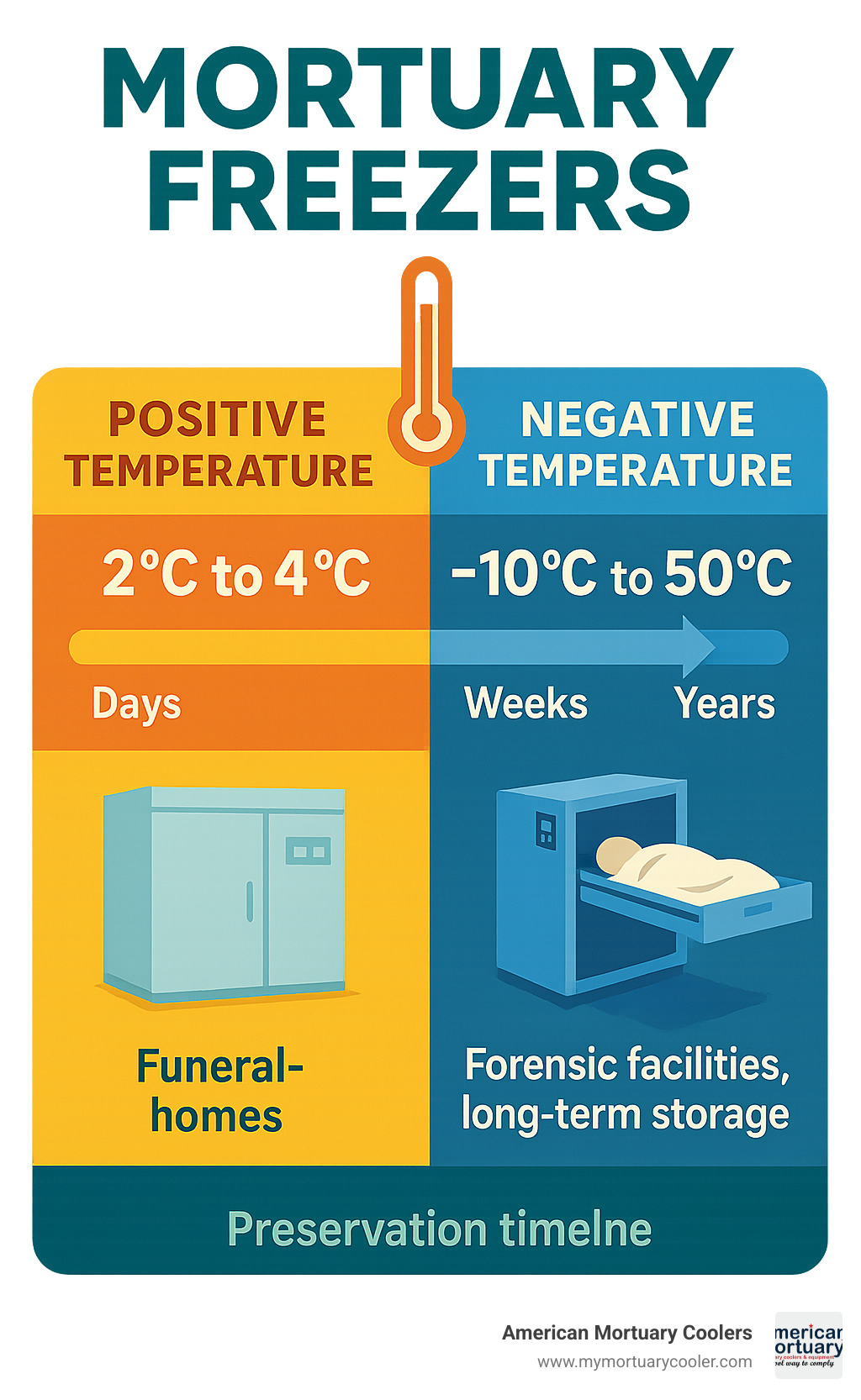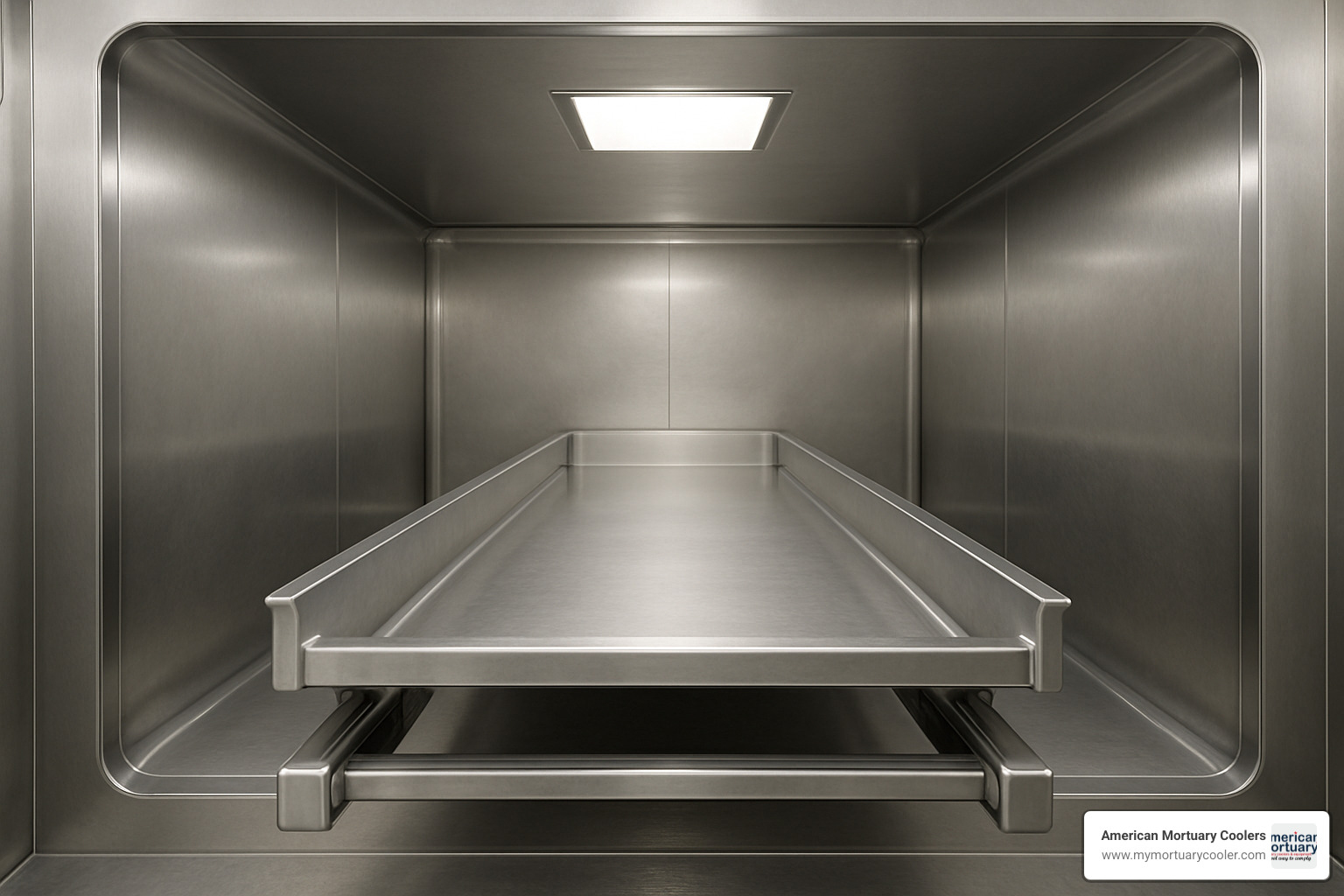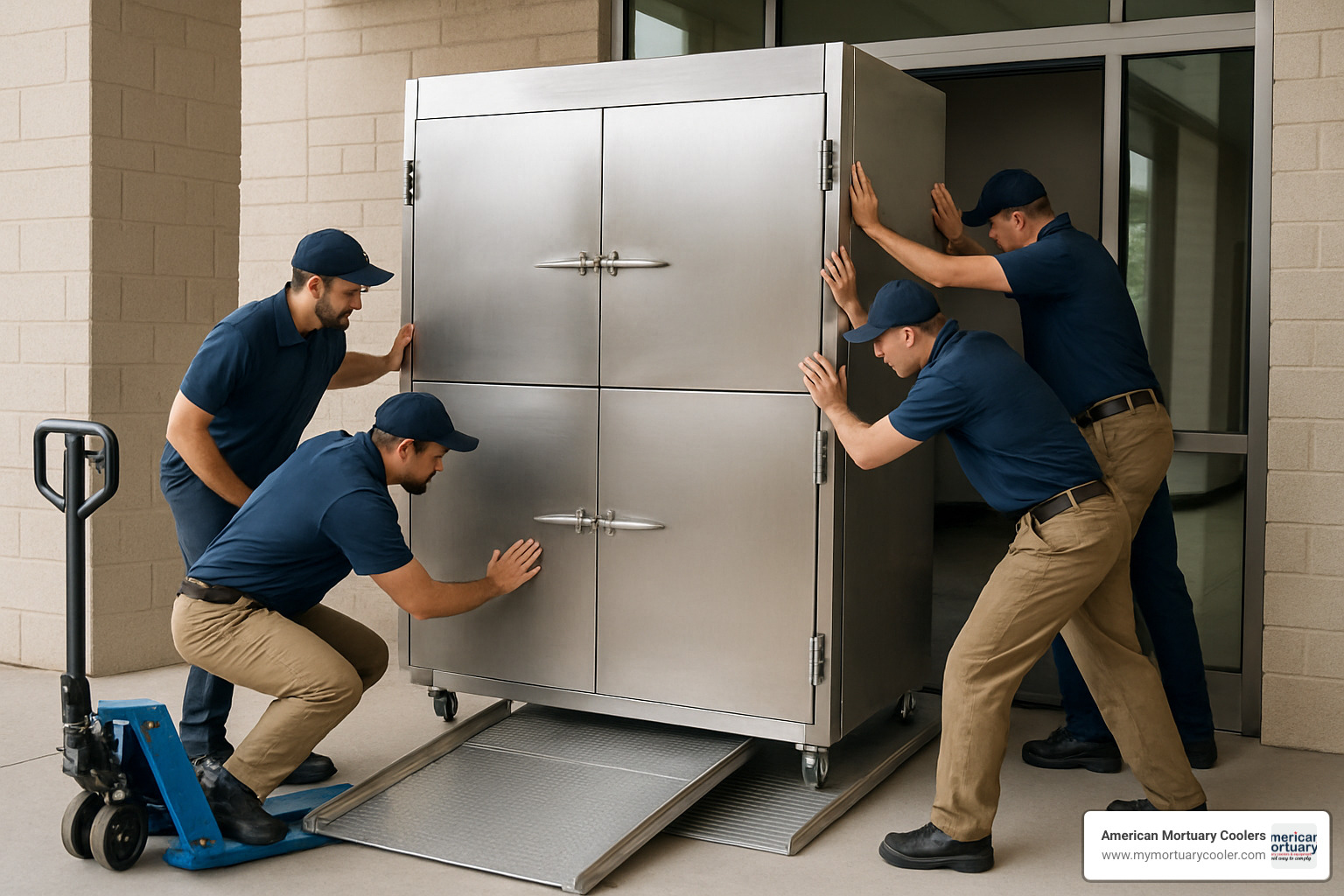
Ultimate Checklist for Choosing Mortuary Freezers
Why Proper Body Preservation Equipment Matters
Mortuary-freezers- are specialized refrigeration units designed to preserve human remains at controlled temperatures, preventing decomposition while maintaining dignity and hygiene standards. These essential pieces of equipment serve funeral homes, hospitals, morgues, and forensic facilities by providing safe, respectful storage for the deceased.
Quick Answer for Mortuary Freezer Selection:
- Positive temperature units (2°C to 5°C) for short-term storage up to several days
- Negative temperature freezers (-10°C to -50°C) for long-term preservation and forensic use
- Capacity options range from single-body units to walk-in chambers storing 50+ bodies
- Key features include stainless steel construction, digital controls, and safety alarms
- Standard models typically measure 7'8" x 3'1" x 5'6.5" for 3-body storage
- Power requirements often just need standard 110V outlets with self-contained refrigeration
When someone dies, the human body begins decomposing within hours. Without proper refrigeration, remains can only be stored safely for a very short time. Modern mortuary freezers solve this challenge by maintaining precise temperatures that dramatically slow or halt decomposition.
The choice between different types of mortuary freezers depends on your specific needs. Funeral homes typically use positive-temperature coolers for temporary storage before services, while forensic institutes rely on negative-temperature freezers to preserve evidence indefinitely.
Temperature control isn't just about preservation - it's about providing families the time they need to make arrangements while treating their loved ones with respect.
As Mortuary Cooler, a national-level mortuary cooler supplier with experience in the funeral industry, I've helped countless facilities select the right mortuary-freezers- for their specific needs and space constraints. My background includes working directly with funeral directors to ensure they get reliable, American-made equipment that arrives on time and performs consistently.

Simple guide to mortuary-freezers- terms:
Understanding Mortuary Freezers: Purpose & Types
When you're shopping for mortuary-freezers-, it helps to think of them like choosing a car - you need to match the right type to how you'll actually use it. Most facilities choose from five main categories, and each serves a different purpose in the funeral industry.
Core Purpose of Body Preservation
Short-term cooling is what most funeral homes need day-to-day. These units keep bodies at 2°C to 5°C - cold enough to slow decomposition significantly, but not so cold that preparation becomes difficult. Think of it as buying time for families to make arrangements and for funeral directors to do their work properly.
Long-term freezing takes things to another level, with temperatures dropping to -10°C to -50°C. This essentially stops decomposition in its tracks. We see this most often in forensic facilities where evidence needs to be preserved for months or even years while legal cases unfold.
Cultural and religious needs also shape preservation requirements. Some faiths require specific timing for burial rites, while others need extended periods for family members to travel from far away.
Forensic evidence storage represents the most demanding use case. When human remains are part of a legal investigation, preservation quality can literally make or break a case. These facilities need the reliability and precision that only professional-grade negative-temperature chambers can provide.
Main Categories Explained
Positive-temperature units are the workhorses of the funeral industry. Operating between 2°C and 4°C, they slow decomposition without freezing the body solid. This means embalming and other preparation procedures can proceed normally. Most funeral homes rely on these for their everyday storage needs.
Negative-temperature chambers freeze remains completely at temperatures from -10°C to -50°C. Forensic labs depend on these for evidence storage, but some funeral homes also use them for overflow during busy periods or when families need extra time to arrange services from out of state.
Modular cold rooms offer incredible flexibility. Built from prefabricated panels, these systems can grow with your business. We've seen facilities start with a compact 4-5 body module and later expand to 24-30 body capacity without starting over from scratch.
Roll-in cabinets make the most of limited space while keeping loading easy. Bodies stay on their stretchers and roll directly into refrigerated compartments. These work particularly well for facilities with tight floor plans or those regularly handling bariatric cases.
Walk-in boxes maximize storage by using vertical space efficiently. With adjustable cantilever racks, a single walk-in unit can accommodate anywhere from 5 to 50 bodies depending on how you configure it. For high-volume operations, these offer the best value per body stored.
Key Technical Specifications for mortuary-freezers-
The devil is in the details when it comes to mortuary-freezers-. After years of helping funeral homes choose equipment, I've learned that the technical specifications make all the difference between a unit that serves you well for decades and one that becomes a constant headache.
Temperature Ranges for mortuary-freezers-
Temperature control is absolutely critical - it's the whole reason these units exist. Standard positive-temperature units maintain that sweet spot between 2°C and 5°C with accuracy within ±1°C. This range effectively slows decomposition while keeping remains workable for preparation procedures.
The precision matters more than you might think. A unit that swings wildly between temperatures can cause condensation problems, affect preservation quality, and even trigger false alarms. That's why we always recommend PID controllers - they provide the steady, accurate temperature control that professional facilities need.
Deep-freeze units operate in a completely different world, maintaining temperatures from -10°C down to -50°C. These aren't just beefed-up versions of regular freezers. They use specialized refrigeration components designed specifically for extreme low-temperature operation. Forensic facilities often need the coldest temperatures for long-term evidence preservation.
Modern mortuary-freezers- include smart redundancy systems that act like insurance policies. Dual compressors mean if one fails, the backup kicks in automatically. Safety alarms alert staff immediately to any temperature excursions. Data logging capabilities create permanent records that satisfy compliance requirements and help track performance over time.
The slide-out trays might seem like a small detail, but they make a huge difference in daily operations. Heavy-duty telescoping rails support up to 150kg per tray while operating smoothly enough to reduce physical strain on staff.

Advanced Controls in mortuary-freezers-
Today's mortuary-freezers- have gotten surprisingly sophisticated. Touch-screen PLC systems have replaced those old-fashioned analog controls, providing intuitive operation that doesn't require an engineering degree to understand. These systems track temperature trends, log every event, and provide early warnings before small issues become big problems.
Remote monitoring has been a game-changer for many of our customers. Facility managers can check unit status from anywhere using smartphone apps or web interfaces. This proves especially valuable for after-hours peace of mind and facilities managing multiple locations.
Low-ambient kits solve a common installation challenge. These modifications allow units to operate reliably in unheated spaces or even outdoor installations. If you're dealing with space constraints or unconventional installation locations, these kits expand your options significantly.
Door jamb heaters prevent ice buildup that could compromise door seals. Poor sealing leads to temperature fluctuations, higher energy costs, and potential equipment damage.
Sustainability-focused refrigerants like R-134a represent the industry's shift toward environmental responsibility. These eco-friendly alternatives provide equivalent cooling performance while reducing environmental impact and ensuring compliance with evolving regulations.
The construction materials matter just as much as the fancy controls. Stainless steel interiors resist corrosion and simplify cleaning. Polyurethane insulation provides superior thermal efficiency compared to older materials. Digital controllers offer precision that mechanical systems simply can't match.
Compliance, Hygiene & Cultural Considerations
When you're dealing with mortuary-freezers-, you're not just buying refrigeration equipment - you're investing in equipment that must meet some of the strictest standards in any industry. At American Mortuary Coolers, we've learned that successful facilities go beyond just meeting minimum requirements.
The regulatory landscape can feel overwhelming. NSF certification ensures your equipment meets commercial food service standards, which apply to mortuary equipment. OSHA compliance protects your staff from workplace hazards. ASTM E84 flame spread ratings matter for building code approval. If you're in the UK or working with international standards, REFCOM certification becomes important too.
But the best mortuary-freezers- don't just check regulatory boxes. They're designed with antimicrobial interiors that actively fight contamination. They feature easy-clean surfaces that make daily maintenance manageable. They include bariatric storage options because every family deserves dignity regardless of size.
Cultural sensitivity isn't an afterthought - it's fundamental to serving your community well. We've worked with facilities serving diverse populations, and we've seen how the right equipment design can honor religious guidelines while maintaining respectful handling practices that matter to grieving families.
Preventing Contamination & Odor
Nobody wants to think about contamination and odor issues, but preventing them starts with smart design choices. Seamless panels eliminate those tiny crevices where bacteria love to hide. When we build our units, we use continuous welded joints and coved corners that you can actually clean properly - not just wipe down and hope for the best.
Forced-air circulation does more than just maintain temperature. It prevents those stagnant air pockets that can create unpleasant surprises. The best systems create gentle, consistent airflow patterns that keep everything fresh while maintaining uniform cooling throughout the storage space.

Modern mortuary-freezers- can include UV sterilization systems that add an extra layer of protection. Some units feature specialized coatings with antimicrobial properties that actively inhibit bacterial growth. These aren't just marketing features - they're practical solutions that make your daily operations cleaner and safer.
High-density racks maximize your storage capacity while maintaining easy access. Autopsy tables integrated with refrigeration systems serve facilities that need both storage and examination capabilities. Leak-proof floors with proper drainage handle condensation and cleaning water without creating slip hazards or contamination risks.
Meeting Legal, Religious, and Ethical Standards
Every state has different local health codes, and frankly, keeping track of them all can be a full-time job. That's why we stay current on requirements across all 48 states where we deliver. Whether you're in Tennessee like us, or clear across the country in Washington, we make sure your equipment meets local standards from day one.
Chain-of-custody requirements get serious when forensic work is involved. Modern units can include electronic locks, access cards, and automatic logging of door openings. These features aren't just about compliance - they protect your facility from liability and ensure evidence integrity that could affect legal proceedings.
Religious considerations require thoughtful planning. Muslim ghusl rooms need specific layouts and features. Some Christian denominations prefer certain viewing arrangements. Jewish facilities often have timing requirements that affect storage needs.
Extended viewing needs challenge your refrigeration systems in ways that basic storage doesn't. When families need weeks rather than days to make arrangements, your equipment needs to maintain perfect conditions for much longer periods.
Disaster response represents the ultimate test of mortuary equipment. Mobile units that can be rapidly deployed to emergency sites must operate reliably under challenging conditions.
Buying Checklist: Capacity, Layout & Budget
Choosing the right mortuary-freezers- feels overwhelming at first, but breaking it down into manageable steps makes the process much clearer. We've guided hundreds of facilities through this decision, and the key is balancing your current needs with realistic growth projections while staying within budget.
Start by honestly assessing your space constraints and measuring the available area. That cramped corner might look sufficient until you realize staff need room to maneuver stretchers safely. Consider ceiling height for walk-in units and door widths for delivery access.
Your expected caseload drives capacity decisions more than anything else. A small funeral home handling 50 cases annually needs different equipment than a medical examiner's office processing 200+ cases. Factor in seasonal variations - many facilities see increased volume during winter months or holiday periods.
Cost & Financing Breakdown
Mortuary-freezers- pricing starts around $6,000 for basic 2-body units and climbs to over $15,000 for 6-body configurations. Walk-in systems and specialized forensic units command premium prices, but they deliver better per-body storage costs for high-volume operations.
Don't overlook operating expenses when calculating total ownership costs. Energy-efficient models with superior insulation save hundreds of dollars annually on electricity bills. We've seen facilities reduce their monthly utility costs by 30-40% simply by choosing well-insulated units over budget alternatives.
Financing options make quality equipment accessible without straining cash flow. Many suppliers offer lease-to-own programs with 0% down payment and monthly terms that fit funeral home budgets. Some manufacturers provide 90-day no-payment periods to help during slower business cycles.
Extended warranties provide budget predictability and peace of mind. Premium manufacturers back their mortuary-freezers- with 15-year panel warranties and 5-year mechanical coverage. These comprehensive warranties reflect genuine confidence in build quality while protecting your investment.
More info about morgue freezer rentals covers rental solutions for facilities facing temporary capacity needs or uncertain demand patterns.
Site Preparation & Installation
Modern mortuary-freezers- simplify installation by requiring only standard 110V electrical connections. No expensive electrical upgrades or special wiring - most units plug directly into regular outlets like household appliances.
Floor loading becomes critical for larger installations. Standard concrete floors handle typical equipment weights easily, but older buildings with wooden floors may need structural evaluation. We provide detailed weight specifications so you can verify your facility's capacity before delivery.
Ventilation requirements vary depending on unit size and location. Indoor installations need adequate airflow around condensing units for proper heat rejection. Outdoor installations require weather protection and low-ambient kits to ensure reliable operation during temperature extremes.
Ramp access makes a huge difference for daily operations. Even a small threshold can create challenges when moving stretchers and equipment.

At American Mortuary Coolers, our service network includes installation partners throughout the contiguous 48 states. Professional installation ensures proper setup, thorough testing, and comprehensive staff training. We don't just deliver equipment - we make sure your team knows how to operate it safely and efficiently from day one.
Maintenance, Rentals & Emerging Technologies
Keeping your mortuary-freezers- running smoothly isn't just about preventing breakdowns - it's about ensuring these critical units work perfectly when families need them most. We've seen too many facilities learn this lesson the hard way during their busiest times.
Routine cleaning should happen weekly, focusing on interior surfaces and door seals. A simple wipe-down with approved disinfectants prevents buildup that could compromise hygiene or door sealing. Condenser checks every month keep cooling systems running efficiently - dirty condensers work harder and fail sooner.
Alarm testing deserves special attention since these systems protect your most valuable contents. Test temperature alarms, door alarms, and backup systems monthly. We recommend keeping a simple log to track these checks - it helps identify patterns before they become problems.
The beauty of modern mortuary-freezers- lies in their reliability, but even the best equipment benefits from professional maintenance. Most manufacturers recommend annual service visits from qualified technicians who can spot potential issues before they interrupt your operations.
When to Opt for Rental Solutions
Sometimes buying isn't the answer, and that's perfectly okay. Temporary caseload spikes during flu seasons or health emergencies can overwhelm even well-planned facilities. Rental units provide immediate relief without the headache of storing unused equipment later.
Facility renovations create unique challenges - you can't exactly move bodies to the break room while upgrading your main storage. Rental mortuary-freezers- keep operations running smoothly during construction projects, ensuring families never experience disruptions.
Mass-fatality events unfortunately require rapid response capabilities. Rapid deployment trailers can reach disaster sites within hours, providing crucial storage capacity when communities need it most. These mobile units maintain the same dignity and hygiene standards as permanent installations.
Seasonal demand affects facilities differently - tourist areas see summer spikes, while northern regions experience winter increases. Renting additional capacity for predictable busy periods often makes more financial sense than purchasing equipment used only occasionally.
Latest research on mobile cold storage shows how rental solutions continue evolving to meet diverse facility needs across different regions and circumstances.
Technology Trends to Watch
The funeral industry might seem traditional, but mortuary-freezers- are embracing some pretty impressive innovations. IoT sensors now monitor everything from temperature fluctuations to door seal integrity, sending alerts before problems affect your operations.
Cloud temp logs create permanent, tamper-proof records accessible from anywhere. No more wondering if that weekend temperature spike actually happened - the data lives safely in the cloud with detailed timestamps and trend analysis.
Energy-smart compressors with variable speed drives represent a game-changer for operating costs. These systems adjust cooling output based on actual demand, significantly reducing utility bills during slower periods. We've seen facilities cut energy costs by 30% or more with these advanced systems.
Bio-safe coatings continue improving pathogen control inside storage compartments. New antimicrobial formulations last longer while maintaining the easy-clean surfaces essential for mortuary applications.
Solar backup systems provide peace of mind during power outages. Battery storage can maintain critical temperatures for days, protecting contents even during extended utility failures. These systems pay for themselves through reduced insurance costs and prevented losses.
Frequently Asked Questions about Mortuary Freezers
Over the years, we've helped hundreds of funeral directors and facility managers choose the right mortuary-freezers- for their needs. These three questions come up in almost every conversation, so let me share the answers that matter most.
What size mortuary freezer do I need?
The right size depends on your typical caseload and how long you need to store remains. I always tell customers to think about their busiest weeks, not their average ones.
Small funeral homes handling 2-3 cases monthly usually do well with a 2-body unit. These compact models fit in tight spaces while providing reliable storage for normal operations. If you're just starting out or have limited space, this size gives you room to grow.
Medium-sized operations with 4-8 cases monthly often need 4-6 body capacity. These units handle regular workflow while providing buffer space for unexpected situations. Most of our customers in this category choose 4-body models as their sweet spot.
High-volume facilities or those serving large communities may need walk-in systems that store 10-50 bodies. These make sense when you're handling multiple cases daily or need long-term storage capabilities.
Here's my rule of thumb: take your busiest month, add 25-50% extra capacity, then choose the next size up. This prevents scrambling for space during flu season or other challenging periods. Better to have room you don't always need than to run out of space when families are counting on you.
How often should mortuary-freezers- be serviced?
Regular maintenance keeps your mortuary-freezers- running reliably when you need them most. I've seen too many facilities learn this lesson the hard way during their busiest times.
Quarterly inspections should cover the basics you can handle in-house. Clean the condenser coils, check door seals for cracks or gaps, and verify temperature readings match your thermometer. These simple steps prevent most common problems.
Annual professional service goes deeper into the refrigeration system. A qualified technician should check refrigerant levels, test electrical connections, calibrate temperature controls, and verify safety alarms work properly. This investment prevents expensive breakdowns and extends equipment life.
High-use facilities might benefit from more frequent professional service, especially if you're running units at full capacity regularly. The extra attention pays for itself in reliability and peace of mind.
Don't skip maintenance to save money - emergency repairs always cost more than preventive service, and they happen at the worst possible times.
Can mortuary-freezers- run on standard electrical outlets?
This question surprises many people, but most modern mortuary-freezers- plug into standard 110V outlets just like your office refrigerator. Self-contained refrigeration systems include everything needed in a single unit.
Standard body boxes (2-6 body capacity) typically require only normal household current. This makes installation much simpler and less expensive since you won't need electrical upgrades or special wiring in most cases.
Larger walk-in units may need 220V connections, similar to electric dryers or workshop equipment. Even these installations are usually straightforward for a qualified electrician.
The beauty of modern mortuary-freezers- is their plug-and-play design. Once we deliver your unit, it's often ready to operate within minutes of plugging it in. This simplicity reduces installation costs and gets you up and running quickly.
At American Mortuary Coolers, we've designed our units specifically for easy installation in existing facilities. Most of our Tennessee-built equipment arrives ready to plug in and start preserving remains with dignity and reliability.
Conclusion
After working with funeral directors and facility managers across Tennessee and the contiguous 48 states, I've learned that selecting the right mortuary-freezers- comes down to understanding your unique needs and working with suppliers who truly care about your success.
At American Mortuary Coolers, we've built our reputation on providing custom solutions that work for real facilities dealing with real families during their most difficult moments. Every conversation starts with understanding your specific situation - whether you're a small funeral home handling a few cases monthly or a large facility managing complex storage requirements.
The path to choosing the right equipment becomes much clearer when you focus on the essential elements: determining whether you need positive or negative temperature storage, calculating your capacity requirements with room for growth, and verifying that your electrical and space constraints match your chosen unit. Regulatory compliance varies by location, so we always confirm your local requirements before recommending specific models.
Warranty coverage and ongoing service matter more than many people realize. When families are counting on you, equipment failures simply aren't acceptable. That's why we emphasize manufacturers who stand behind their products with comprehensive warranties and reliable service networks.
Financing options can make the difference between getting the right equipment now versus settling for something that doesn't quite fit your needs. Many facilities benefit from lease-to-own programs or extended payment terms that preserve cash flow while ensuring proper equipment selection.
What sets quality mortuary-freezers- apart isn't just their technical specifications - it's how they support your ability to provide dignified care when families need it most. Reliable temperature control, easy cleaning, and dependable operation all contribute to maintaining the respect and professionalism that families deserve.
Our custom approach means we're not trying to fit you into a standard box. Whether you need a compact 2-body unit that fits into a tight space or a walk-in system that maximizes storage efficiency, we work with you to find solutions that actually work for your facility and your community.
The best mortuary freezer is the one that works reliably when you need it, fits your space and budget, and helps you serve families with dignity and respect.
More info about choosing and operating units provides additional guidance for facilities ready to make informed decisions about their refrigeration needs.



